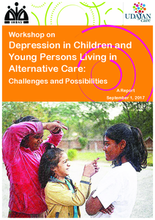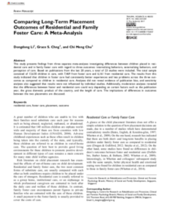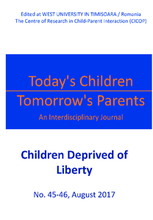Displaying 331 - 340 of 771
This chapter aims to present a research grounded in the bioecology of human development that analyzed shelter institutions through the perceptions of children aged from 7 to 12 years in Brazil.
This video from UNICEF Rwanda shows some of the moving stories of children and their new families who have been brought together through the TMM initiative, which reintegrates children who have been living in institutions into families and the community.
This document provides a full report of the workshop on “Depression in Children and Young Persons living in Alternative Care: Challenges and Possibilities.”
This study examined visual recognition memory and executive functioning (spatial working memory, spatial planning, rule learning, and attention shifting) in 12-year-olds who participated in the Bucharest Early Intervention Project, a randomized controlled trial of foster care for institutionally reared children.
This presentation delivered by Dr. Kristen Cheney describes her research findings on the "Orphan Industrial Complex," which suggest that orphan tourism, orphanage volunteering, and donor support for orphanages are the primary drivers of the unnecessary separation of children from their families and the harmful institutionalization of children.
This article utilizes data from the Bucharest Early Intervention Project to examine the neural indices of cognitive control and visual attention biases in children who have been institutionalized in order to understand how they influence the emergence of psychopathology in children with experience in institutional care.
This study aimed to find the prevalence rate of PTSD, anxiety and depression among orphaned children in Gaza Strip.
This study presents findings from three separate meta-analyses investigating differences between children placed in residential care and in family foster care with regard to three outcomes: internalizing behaviors, externalizing behaviors, and perception of care.
This special issue of the journal Today's Children are Tomorrow's Parents explores the issue of children deprived of liberty, or the detention of children, around the globe from the perspective of experts from various disciplines.
On 17 August 2017, the Australian Foreign Affairs and Aid Sub-Committee was briefed by representatives from the Cambodian Children’s Trust and Forget Me Not Foundation on the issue of orphanage tourism. This link includes a video of the opening statements from this briefing.




